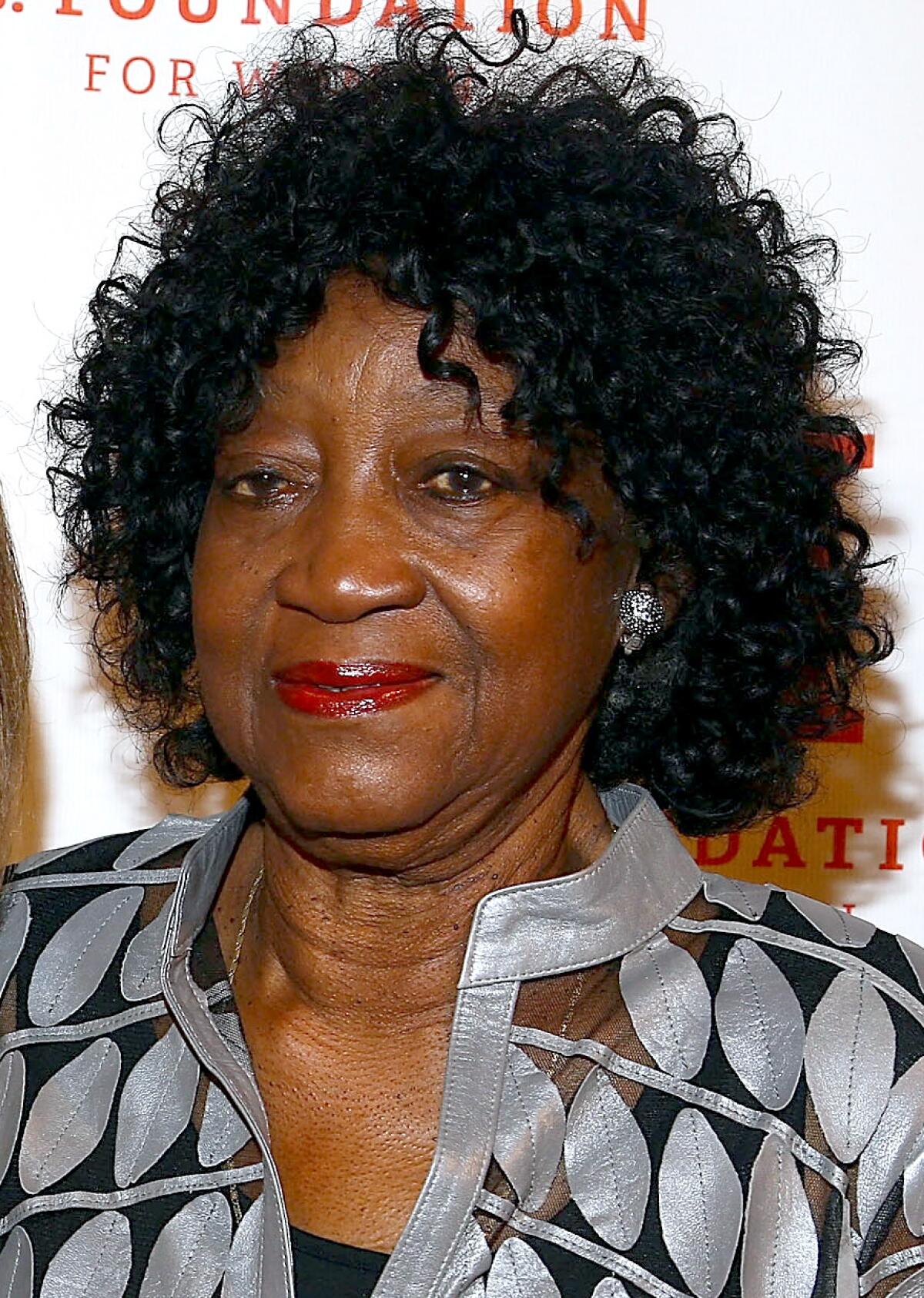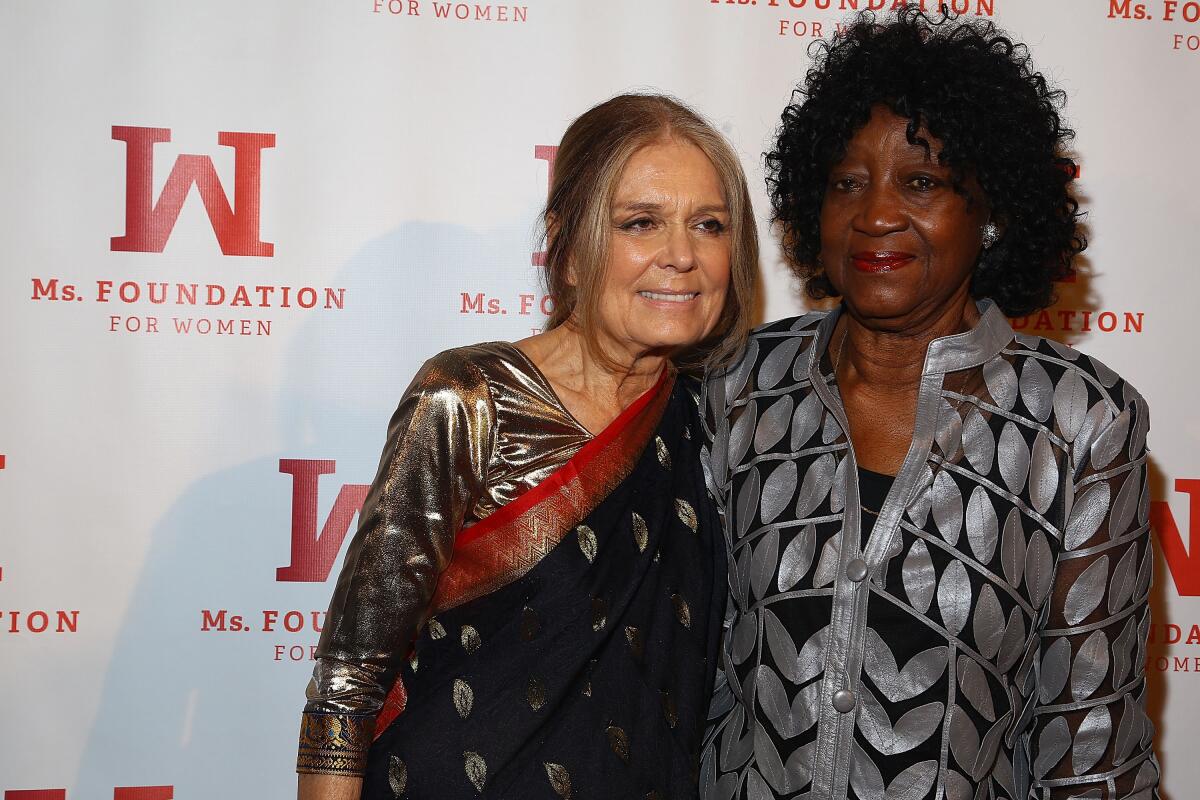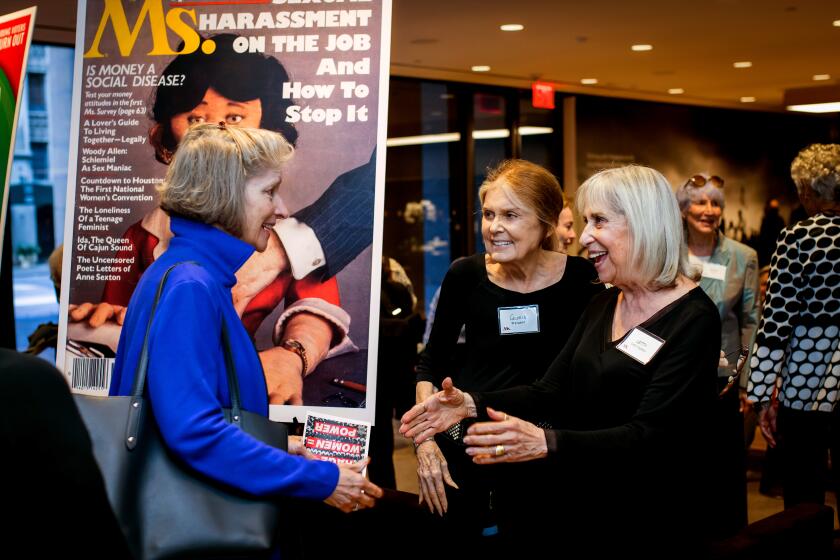Dorothy Pitman Hughes, pioneering Black feminist who inspired Ms. Magazine, dies

- Share via
Dorothy Pitman Hughes, a pioneering Black feminist, child welfare advocate and lifelong community activist who toured the country speaking with Gloria Steinem in the 1970s and inspired the founding of Ms. Magazine, has died at 84.
Hughes died at her daughter’s home in Tampa, Fla., on Dec. 1. Her daughter, Delethia Ridley Malmsten, said she died of natural causes.
Though they came to their feminist activism from different vantage points — Hughes from her community-based work and Steinem from journalism — the two forged a powerful speaking partnership in the early 1970s, touring the country at a time when feminism was seen as predominantly white and middle class, a divide dating back to the origins of the American women’s movement. Steinem credited Hughes with helping her become comfortable speaking in public.
In one of the most famous images of the era, taken in October 1971, the two raised their right arms in the Black power salute. The photo is now in the National Portrait Gallery.
Hughes, her work always rooted in community activism, organized the first shelter for battered women in New York City and co-founded the New York City Agency for Child Development to broaden child care services in the city. But she was perhaps best known for her work helping countless families through the community center she established on Manhattan’s West Side, offering day care, job training, advocacy training and more.
“She took families off the street and gave them jobs,” Malmsten said.
“My friend Dorothy Pitman Hughes ran a pioneering neighborhood childcare center on the west side of Manhattan,” Steinem said in an email. “We met in the seventies when I wrote about that childcare center, and we became speaking partners and lifetime friends. She will be missed, but if we keep telling her story, she will keep inspiring us all.”

Laura L. Lovett, whose biography of Hughes, “With Her Fist Raised,” was published last year, said in Ms. Magazine that Hughes “defined herself as a feminist, but rooted her feminism in her experience and in more fundamental needs for safety, food, shelter and child care.”
Born Dorothy Jean Ridley on Oct. 2, 1938, in Lumpkin, Ga., Hughes committed herself to activism at an early age, according to her family. When she was 10, her father was nearly beaten to death and left on the family’s doorstep. The family believed he was attacked by the Ku Klux Klan, and Hughes decided to dedicate herself to helping others through activism, according to her family.
She moved to New York City in the late 1950s when she was nearly 20 and worked as a salesperson, nightclub singer and house cleaner. By the 1960s she had become involved in the civil rights movement and other causes, working with the Rev. Martin Luther King Jr., Malcolm X and others.
In the late 1960s, she set up her West 80th Street Childcare Center, providing daycare and also support for parents.
“She realized that child-care challenges were deeply entangled with issues of racial discrimination, poverty, drug use, substandard housing, welfare hotels, job training and even the Vietnam War,” Lovett wrote last year.
Attending the 50th anniversary of Ms. last week, I thought I would find anger and regret. Instead I found memories of an anti-toxic office culture.
It was at the center that Hughes met Steinem, then a journalist writing a story for New York Magazine. They became friends and, from 1969 to 1973, spoke across the country at college campuses, community centers and other venues on gender and race issues.
“Dorothy’s style was to call out the racism she saw in the white women’s movement,” Lovett said in Ms. “She frequently took to the stage to articulate the way in which white women’s privilege oppressed Black women but also offered her friendship with Gloria as proof this obstacle could be overcome.”
In the early 1970s Hughes also helped found, with Steinem, the Women’s Action Alliance, a broad network of feminist activists aiming to coordinate resources and push for equality on a national level. Though Hughes was often said to have also co-founded Ms. Magazine with Steinem in the same era and biographer Lovett said she helped inspire the idea, she did not have a formal role with the magazine.
“It was our difference in experience that made us good lecture partners,” Steinem noted. She recalled also collaborating with Hughes on protesting so-called “welfare hotels” in New York for poor families in the 1970s. “Dorothy was key to exposing living conditions there,” Steinem said. “She truly was a great community activist.”
By the 1980s, Hughes had moved to Harlem and opened an office supply business, Harlem Office Supply, the rare stationery store at the time that was run by a Black woman. But she was forced to sell the store when a Staples opened nearby, part of President Clinton’s Upper Manhattan Empowerment Zone program.
Hughes was portrayed in “The Glorias,” the 2020 film about Steinem, by actor Janelle Monaé.
She is survived by daughters Patrice Quinn, Angela Hughes and Malmsten.
More to Read
Start your day right
Sign up for Essential California for the L.A. Times biggest news, features and recommendations in your inbox six days a week.
You may occasionally receive promotional content from the Los Angeles Times.








